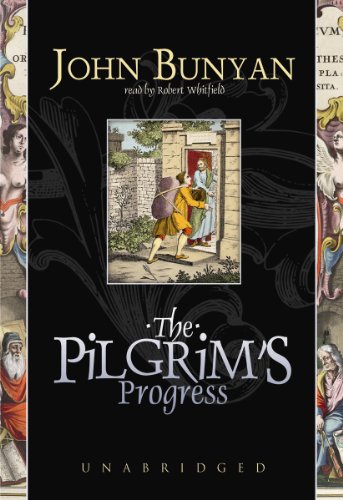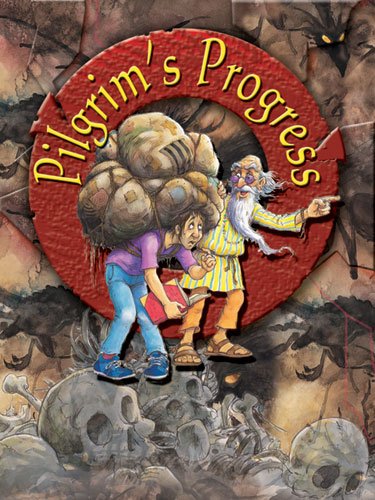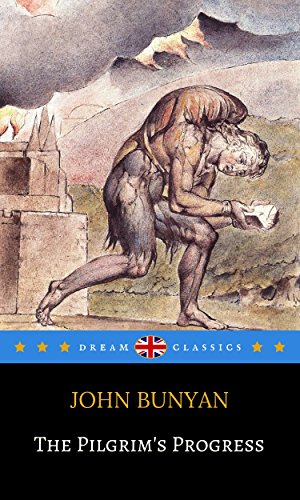-
The Pilgrim's Progress
John Bunyan
eBook (, April 18, 2020)The Pilgrim's Progress from This World to That Which Is to Come is a Christian allegory written by John Bunyan and published in February, 1678. It is regarded as one of the most significant works of English literature, has been translated into more than 200 languages, and has never been out of print
-
The Pilgrim's Progress
John Bunyan, Robert Whitfield
2002 (Blackstone Audio, Inc., March 1, 2002)Next to the Bible, The Pilgrim's Progress has probably been more widely read than any other book in the English language, and rightfully so. It is considered by many critics to be the greatest allegory in any language. And to think that it was written by a jailed tinker who received very little formal education! This classic allegory tells of a Christian's epic journey toward heaven and the many temptations and distractions he encounters along the way. With a burden on his back, Christian reads a book that tells him that the city in which he and his family dwell will be set ablaze. Christian flees from the City of Destruction and journeys through the Slough of Despond, the Valley of Humiliation, the Valley of the Shadow of Death, Vanity Fair, Doubting Castle, and the Delectable Mountains before finally reaching the Celestial City. The Pilgrim's Progress holds a unique place in the history of English literature. Bunyan captures the speech of ordinary people as accurately as he depicts their behavior and appearance and as firmly as he realizes their inner emotional and spiritual life.
-
Pilgrim's Progress
Tim Dowley
Paperback (Candle Books, May 1, 2008)Dowley presents a classic retelling of John Bunyan's Pilgrim's Progress. Young readers can follow Christian as he sets out on the journey of his life. L
L
-
The Pilgrim's Progress
John 1628-1688 Bunyan, William Thomas 1849-1912 ed Stead
Hardcover (Wentworth Press, Aug. 29, 2016)This work has been selected by scholars as being culturally important, and is part of the knowledge base of civilization as we know it. This work was reproduced from the original artifact, and remains as true to the original work as possible. Therefore, you will see the original copyright references, library stamps (as most of these works have been housed in our most important libraries around the world), and other notations in the work.This work is in the public domain in the United States of America, and possibly other nations. Within the United States, you may freely copy and distribute this work, as no entity (individual or corporate) has a copyright on the body of the work.As a reproduction of a historical artifact, this work may contain missing or blurred pages, poor pictures, errant marks, etc. Scholars believe, and we concur, that this work is important enough to be preserved, reproduced, and made generally available to the public. We appreciate your support of the preservation process, and thank you for being an important part of keeping this knowledge alive and relevant.
-
Pilgrim's Progress
John Bunyan, John Fabian
eBook (Commodius Vicus, Dec. 21, 2010)The illustrated classic story of one man's physical and spiritual journey to reach Heaven. Written in 1677, Pilgrim's Progress is one of the great religious works in English literature.
-
The Pilgrim's Progress
John Bunyan, Dream Classics
eBook (Adrien Devret, June 13, 2017)The Pilgrim's Progress from This World, to That Which Is to Come is a 1678 Christian allegory written by John Bunyan. It is regarded as one of the most significant works of religious English literature, has been translated into more than 200 languages, and has never been out of print. It has also been cited as the first novel written in English.Be sure to check out our other books available !
-
PILGRIM'S PROGRESS Easton Press
John Bunyan
Hardcover (Easton Press, Jan. 1, 1979)This is a book originally sold by The Easton Press, 47 Richards Avenue, Norwalk, CT 06857 as part of its "100 Greatest Books Ever Written Collector's Edition" collection which then evolved into "The Greatest Books Ever Written" collection. Many of the books carry a 1979 copyright but may have been printed in different years with different cover art. This is a leather-bound volume featuring 22kt gold accents, illustrations, moiré fabric endsheets, gilded page ends, and a satin-ribbon page marker. The Pilgrim's Progress from This World, to That Which Is to Come is a 1678 Christianallegory written by John Bunyan. The entire book is presented as a dream sequence narrated by an omniscient narrator. The allegory's protagonist, Christian, is an everyman character, and the plot centres on his journey from his hometown, the "City of Destruction" ("this world"), to the "Celestial City" ("that which is to come" or Heaven) atop Mount Zion. Christian is weighed down by a great burden—the knowledge of his sin—which he believed came from his reading "the book in his hand" (the Bible). This burden, which would cause him to sink into Hell, is so unbearable that Christian must seek deliverance.
-
Pilgrim's progress,
John Bunyan
Hardcover (Frederick A. Stokes company, Jan. 1, 1939)This reproduction was printed from a digital file created at the Library of Congress as part of an extensive scanning effort started with a generous donation from the Alfred P. Sloan Foundation. The Library is pleased to offer much of its public domain holdings free of charge online and at a modest price in this printed format. Seeing these older volumes from our collections rediscovered by new generations of readers renews our own passion for books and scholarship.
-
The Pilgrim's Progress
John Bunyan
eBook (Interactive Media, Sept. 15, 2014)The Pilgrim's Progress is a Christian allegory written by John Bunyan. He began his work while in the Bedfordshire county prison for violations of the Conventicle Act, which prohibited the holding of religious services outside the auspices of the established Church of England. The text is considered one of the most significant works of religious English literature.
-
The Pilgrim's Progress
John Bunyan
Paperback (CreateSpace Independent Publishing Platform, Aug. 27, 2015)The Pilgrim's Progress from This World to That Which Is to Come is a Christian allegory written by John Bunyan and published in February, 1678. It is regarded as one of the most significant works of English literature, has been translated into more than 200 languages, and has never been out of print.
-
The Pilgrim's Progress
John Bunyan
eBook (, May 16, 2010)This unique version of The Pilgrim's Progress also includes the following bonus annotations:- Biography of the author- Historical context of the book- Literary critiqueThe Pilgrim's Progress from This World to That Which Is to Come is a Christian allegory written by John Bunyan and published in February, 1678. It is regarded as one of the most significant works of English literature, has been translated into more than 200 languages, and has never been out of print.Bunyan began the work while in the Bedfordshire county gaol for violations of the Conventicle Act, which prohibited the holding of religious services outside the auspices of the established Church of England. Early Bunyan scholars like John Brown believed The Pilgrim's Progress was begun in Bunyan's second shorter imprisonment for six months in 1675, but more recent scholars like Roger Sharrock believe that it was begun during Bunyan's initial, more lengthy imprisonment from 1660-1672 right after he had written his spiritual autobiography, Grace Abounding to the Chief of Sinners.The English text comprises 108,260 words and is divided into two parts, each reading as a continuous narrative with no chapter divisions.Christian, an everyman character, is the protagonist of the allegory, which centers itself in his journey from his hometown, the "City of Destruction" ("this world"), to the "Celestial City" ("that which is to come": Heaven) atop Mt. Zion. Christian is weighed down by a great burden, the knowledge of his sin, which he believed came from his reading "the book in his hand," (the Bible). This burden, which would cause him to sink into Tophet (hell), is so unbearable that Christian must seek deliverance. He meets Evangelist as he is walking out in the fields, who directs him to the "Wicket Gate" for deliverance. Since Christian cannot see the "Wicket Gate" in the distance, Evangelist directs him to go to a "shining light," which Christian thinks he sees.Christian leaves his home, his wife, and children to save himself: he cannot persuade them to accompany him. Obstinate and Pliable go after Christian to bring him back, but Christian refuses. Obstinate returns disgusted, but Pliable is persuaded to go with Christian, hoping to take advantage of the paradise that Christian claims lies at the end of his journey. Pliable's journey with Christian is cut short when the two of them fall into the Slough of Despond. It is there that Pliable abandons Christian after getting himself out. After struggling to the other side of the bog, Christian is pulled out by Help, who has heard his cries.On his way to the Wicket Gate, Christian is diverted by Mr. Worldly Wiseman into seeking deliverance from his burden through the Law, supposedly with the help of a Mr. Legality and his son Civility in the village of Morality, rather than through Christ, allegorically by way of the Wicket Gate. Evangelist meets the wayward Christian as he stops before Mount Sinai on the way to Legality's home. It hangs over the road and threatens to crush any who would pass it. Evangelist shows Christian that he had sinned by turning out of his way, but he assures him that he will be welcomed at the Wicket Gate if he should turn around and go there, which Christian does.At the Wicket Gate begins the "straight and narrow" King's Highway, and Christian is directed onto it by the gatekeeper Good Will. In the Second Part, Good-will is shown to be Jesus himself.To Christian's query about relief from his burden, Good Will directs him forward to "the place of deliverance."
-
The Pilgrim's Progress
John Bunyan, Roger Sharrock
Hardcover (Oxford University Press, Dec. 31, 1960)A scholarly edition of The Pilgrim's Progress by Roger Sharrock. The edition presents an authoritative text, together with an introduction, commentary notes, and scholarly apparatus.